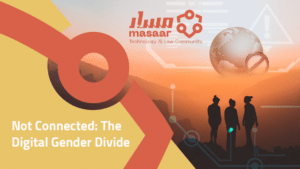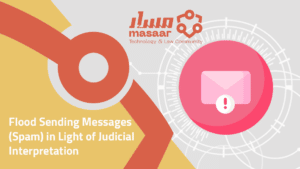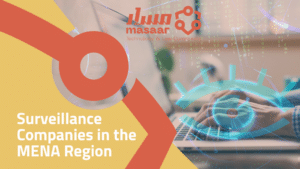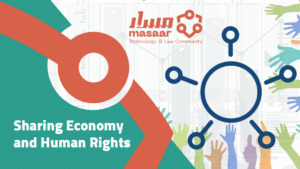Alaa Abd El Fattah’s Life Is In Danger

Starting today, and along with the kick-off of COP27 in Sharm El-Sheikh, programmer, blogger and activist Alaa Abd El Fattah will start a full hunger and water strike. In a letter his mother obtained while visiting him in prison, Abd El Fattah announced that he would stop drinking water on the morning of November 6 in a last bid effort to end his ongoing imprisonment and gain his freedom. Abd El Fattah was arrested in September 2019, and in December 2021 the Emergency State Security Court sentenced him to five years in prison for spreading false news.
Alaa Abd El Fattah had started a partial hunger strike in April of this year, consuming ~100 calories per day, and on November 1 he announced his escalation into a full hunger strike, and on this morning, Alaa Abd El Fattah stopped drinking water as well.
For more details check Access Now #FreeAlaa Campaign
Register now to attend the 5th edition of Bread&Net

The 5th edition of Bread&Net Forum will be on 15,16 and 17 November, and registration is open until November 10. Bread&Net 2022 will host a range of in-person networking and community-building events across Beirut along with live streamed sessions. Bread&Net aim is to promote and strengthen the local culture of digital literacy, privacy, and security while bringing to light the wider digital rights challenges and opportunities emerging in the MENA region.
Masaar – Technology and Law Community is one of the partners supporting the forum organized by SMEX.
Bread&Net Regestiration | Bread&Net Program
Activities of Masaar

Digital Media
How Newsrooms Can Use Technology in their Work?
This paper seeks to comprehensively examine the use of technology in newsrooms, with emphasis on the concept of newsrooms, the difference between traditional and hybrid newsrooms, how newsrooms can utilize technology in their work, and the tools that can be used in these newsrooms.
Link for the paper: In English | In Arabic
How the Supreme Council for Media will Subject Netflix and Disney to Egyptian Laws

In a brief statement posted on its official website, the Supreme Council for Media Regulation (SCMR) announced that streaming platforms such as Netflix and Disney have to be obligated to “the customs and values of the Egyptian state.” The statement of the SCMR renews the concerns related to the council’s expansion in censorship of content presented on streaming platforms according to vague rules that lack clear standards.
Link for the paper: In English | In Arabic
Tech and Equality
Data from a Gender Perspective… How to Close the Data Gap between Genders
According to statistics, males represent 50.5% of the total world population while females represent 49.5% of it. Despite the close ratios, this is not reflected in data on which different fields all over the world depend. Among these fields, that are increasingly and hugely impacting all aspects of life, are the Artificial Intelligence (AI) systems. This paper discusses the negative impacts of data gap between the sexes and recommendations to close that gap.
Link for the paper: In English | In Arabic
Not Connected: The Digital Gender Divide

The dangers posed by the digital gender gap to the livelihood of women all over the world and particularly in its most deprived regions can’t be underestimated. As the Internet and other digital technologies continue transforming our world and societies, whoever is not part of this on-going transformation will be heavily penalized by being excluded from the benefits and opportunities offered by the new digital world.
Link for the paper: In English | In Arabic
Cyberviolence Against Women and Girls
What generally distinguishes Cyberviolence is the ease of committing it due to “the anonymity of violence perpetrators on the Internet,” which makes them feel immune to retribution. Those who don’t commit violence in daily life, offline, may find the courage to commit it through a medium that allows them to hide their identities. On the other hand, the damage suffered through cyberviolence is long-term. In most cases, it might outlive its victim due to “digital permanence”.
Link for the paper: In English | In Arabic
Digital Security for Women: Initiatives and Training Guides
This paper discusses the importance of digital security for women and LGBTQ+ people, in addition to presenting a number of initiatives and training guides that aim to provide technical support to women and the least represented groups when it comes to protecting privacy, data, and digital security.
Link for the paper: In English | In Arabic
Negative effects of Artificial Intelligence
This paper sheds light on the biggest dangers and negative effects surrounding AI, which many fear may become an imminent reality.
Link for the paper: In English | In Arabic
Tech and Law
Compensation for the Publication and Use of Personal Photos on the Internet
The Court of Cassation instituted a new case concerning compensation for the publication and use of personal photos on the Internet without obtaining permission access. This paper explains the ruling of the Court of Cassations and refers to the crisis of the absence of clear legal frameworks providing mechanisms for compensating practices that infringe on privacy.
Link for the paper: In English | In Arabic
Flood Sending Messages (Spam) In Light of Judicial Interpretation

This paper presents some of the basic characteristics of the flood-sending messages crime, explaining the most important judicial applications related to this crime in order to understand the interpretations the Egyptian courts have reached as a first step toward determining the legislative impact of the adoption of Articles 25 and 26.
Link for the paper: In English | In Arabic
Judicial Control in the Cybercrime Law
This paper seeks to shed light on one of the most important procedural controls related to the authority and powers of judicial officers who work on cases of information technology crimes, as they are the ones responsible for enforcing most of the procedural controls stipulated in the Cybercrime Law and its executive regulations.
Link for the paper: In Arabic
Legislative Effect of the Crime of “Administering an Account to Commit a Crime”
Since the executive regulations of the Anti-Cyber and Information Technology Crimes Law were issued, the General Prosecution has expanded in referring cases of digital nature to the Economic Court, being the competent court for hearing this type of crimes. During the period following the issue of the executive regulations, the problems related to the lack of accuracy and clarity of law texts began reflecting obviously in the judicial practices, especially the text of Article 27.
Link for the paper: In English | In Arabic
A Memorandum on the Unconstitutionality of Article (27) of the Anti-Cyber and Information Technology Crimes Law
Masaar presents instructive arguments for the most important problems related to Article 27 of the law through a memorandum on the unconstitutionality of “creating, managing, or using a website or a personal account on an information network aimed at committing or facilitating the commission of a crime punishable by law” stipulated in Article 27 of the Anti-Cyber and Information Technology Crimes Law.
Link for the memorandum: In Arabic
Substantive Defenses Memorandum – Article (27) of the Anti-Cyber and Information Technology Crimes Law
Masar issued a memorandum with the most important substantive defenses, which can be used as a guide, in investigations and trials related to the crime of “creating, managing, or using a website or a personal account with the aim of committing a crime punishable by law” stipulated in Article 27 of the Anti-Cyber and Information Technology Crimes Law.
Link for the memorandum: In Arabic
Privacy
Surveillance Companies in the MENA Region

Masaar presents in this publication a presentation of the most famous surveillance and espionage companies whose products are located in the countries of the Middle East and North Africa. The publication covers 7 companies: NSO Group, Gamma Group, Blue Coat, Sandvine, Hacking Team, Candiru, and Circles.
Link for the publication: In English | In Arabic
Decentralization
How Do Blockchain Applications Affect Human Rights?
The paper’s focus is to illuminate the core concepts of blockchain technology, its advantages and disadvantages, its impact on freedom of expression, Internet freedom, right to privacy, the democratization process, and how it can contribute to transparency and accountability.
Link for the paper: In English | In Arabic
Human Rights and Business
Uber Files: The Trove of Years of Hit and Run
The Uber Files, or the trove as the Guardian editors describe it, are a huge collection of confidential documents from the global company Uber. The trove was acquired by the Guardian after it was leaked by Mark McGinn, a former Uber senior employee. These documents cover Uber’s business in 40 countries around the world, from 2013 to 2017. The period during which Uber transformed from a start-up to a gigantic global economic entity.
Link for the paper: In Arabic
Sharing Economy and Human Rights

People have shared and collaborated from the commencement of civilization. Notwithstanding, the Internet’s emergence has heralded a new period of sharing because of the volume of activities as well as the new ways of doing these activities. One of the definitions of the collaborative economy is that it is an economy that enables the participants to be receivers and providers of goods or services to make transactions easier and minimize their costs. While shared goods can have significant material and financial value, there is a dearth of research on the nexus between these economies and human rights.
Link for the paper: In English | In Arabic
How Businesses Can Benefit from Investing in Privacy
Amidst increasing privacy concerns, businesses around the world, especially tech-oriented firms, are looking to make changes in their policies. Many businesses are investing in policies that are privacy-forward and help boost growth. Since the rise in privacy concerns has resulted in more companies building privacy security policies, large tech-oriented companies are also a part of the process.
Link for the paper: In English | In Arabic
Human Rights Aspects in Digital Health
The paper covers various challenges faced by the digital health industry such as the presence of bias and discrimination, and problems related to data breaches and cyber security. These challenges show that digital health technology is not full proof, and more regulations and efforts are needed to fully utilize its many advantages.
Link for the paper: In English | In Arabic
FinTech and Human Rights Challenges
In the previous several years, the financial environment has drastically transformed. Although some conventional financial firms are wary of new technology, the majority are much more welcoming. FinTech has established standards, and the financial system has grown increasingly transparent and accountable as a response. This paper discusses the different types of FinTech and sheds light on the possible risks to human rights.
Link for the paper: In English | In Arabic
New on “CONNECT” Podcast (Arabic Audio)

- Episode (12): The Impact of Russia’s Cyber War on Neighboring Countries
Listen to the podcast on: Google Podcasts | Apple Podcasts | Anchor | Spotify
- Episode (13): What do you know about the Social Credit System in China?
Listen to the podcast on: Google Podcasts | Apple Podcasts | Anchor | Spotify
- Episode (14): The Economic Court’s Interpretation of Article 27 of the Cybercrime Law
Listen to the podcast on: Google Podcasts | Apple Podcasts | Anchor | Spotify
Press Statements
A Suspended Law: Two years after the issuance of the Personal Data Protection Law, its executive regulations haven’t been issued
Although two years have passed since the Personal Data Protection Law (PDP) have been issued (July 2020), it is still suspended because its executive regulations weren’t issued yet, though issuance articles of the law have determined the date of issuing the executive regulations to be within 6 months of the coming into force of the law. This means that the PDP executive regulations should have been issued in the second quarter of 2021.
Masaar – Technology and Law Community demands the prompt issuance of the Personal Data Protection law executive regulations and the start of the Personal Data Protection Center formation.
Link for the statement: In English | In Arabic
